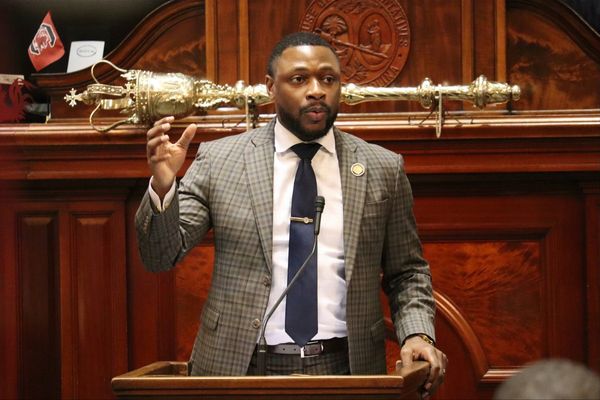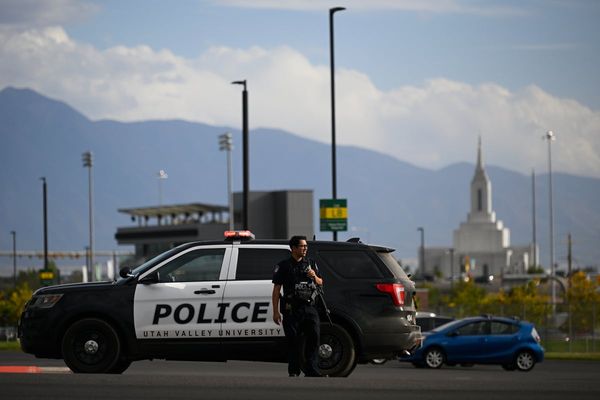SARASOTA, Fla. — The campus was on edge, with more than a dozen police and a bomb-sniffing dog on patrol and rumors spreading that far-right militias were on their way.
Outside an auditorium, a few protesters held up signs declaring: "NO HOSTILE TAKEOVER!"
The focus of the controversy was Christopher Rufo, the most prominent of six conservatives recently named trustees at New College of Florida by the state's governor, Ron DeSantis, as part of his war on "woke."
In a hyper-politicized age in which liberals dominate higher education and conservatives push for more control over what students are taught, this small college overlooking Sarasota Bay looks set to become a pivotal battleground in the war over the mission of public universities.
Rufo, best known for his activism against critical race theory in American education, had come to the left-leaning liberal arts school to hold a pair of town halls, one for faculty and the other for students.
Minutes before the first meeting was to start, the provost announced that she had decided to cancel it because of a threatening email the school had received a day earlier. It was directed at another new trustee who was also scheduled to speak, Jason "Eddie" Speir, the founder of a nearby Christian school: "MAKE SURE THAT YOU HAVE A FLAK JACKET ON."
Rufo and Speir refused to leave.
"This is the problem at your school, you know that, right?" Rufo said, pointing at the provost, Suzanne Sherman. "You've created an environment in which the most intolerant and the most aggressive people who threaten violence can veto you, can veto the president, can veto any changes."
"We are closing this building, sir," Sherman said.
"No, we're not," Rufo said.
Rufo has vowed to scrap "diversity, equity and inclusion" programs and hire new faculty with expertise in constitutional law, "American principles" and what he calls family values. Speir recently floated the idea of terminating all contracts with faculty, staff and administration and then immediately rehiring those who "fit in the new financial and business model."
Education experts worry that the true aim of the new board is not academic freedom or diversity of thought but turning New College into a model for conservative education.
Many of the school's 698 students fear that their professors will be banned from discussing topics such as race and gender.
"Right now, everyone is super scared," said Ellen Benedict, 18, a marine biology student who identifies as nonbinary and is considering a transfer to another school, probably to somewhere in New York, in case DeSantis goes after other colleges in Florida.
"This is bigger than here," Benedict said.
Keith Whittington, a political scientist at Princeton University and author of "Speak Freely: Why Universities Must Defend Free Speech," said New College could become "a real laboratory for how much, and in what way, state governors might intervene in how universities operate."
A majority of U.S. professors identify as far left or liberal — 60% in 2017, up from 41% in 1990, according to surveys by the Higher Education Research Institute at UCLA. And there has been no shortage of cases of universities disinviting conservative speakers, disciplining professors who stray from liberal orthodoxy and policing language.
Whittington has long been concerned about the homogeneity of ideas on college campuses and the mounting conservative backlash. But he said that meddling with the hiring of faculty or the curriculum or ruling certain subjects out of bounds — as some of the new trustees at New College of Florida have vowed to do — "crosses a red line."
"It's appropriate for politicians in some of these states to be worried about the direction their public universities are taking," he said. "The question is: How do you attempt to reform them without seriously damaging them in the process?"
———
New College began as a private institution in 1960, an era when legislators in Florida were purging allegedly subversive civil rights activists, communists and gay people from state institutions. Its founders envisaged it as a bastion of free thought.
The college turned public the next decade because of financial troubles, but it maintained a quirky, anything-goes vibe. In 1992, the Sun Sentinel newspaper described the campus like this: "Shoes are optional. Grades are obsolete. Attitudes are open."
But not entirely. Four years ago, the college's then-president told the Sarasota Herald-Tribune that a study commissioned by administrators found that some students were leaving because the political atmosphere had become "too hostile."
Rufo, 38, says he wants to change that. On the day he was named a trustee, he shared his agenda on Twitter.
"We are now over the walls and ready to transform higher education from within," he wrote. "Our all-star board will demonstrate that the public universities, which have been corrupted by woke nihilism, can be recaptured, restructured, and reformed."
By the time Rufo set foot on campus late last month, many faculty and students were vowing to boycott the town halls. Some were wary of giving Rufo publicity. Others said they felt unsafe.
Rufo and Speir prevailed in their standoff with administrators, and about 200 professors, college staff and community members poured into the auditorium.
"We're going to liberate the campus," Rufo told reporters. "We're going to liberate administrators. We're going to liberate faculty from the cultural hostage takers!"
Groans filled the room as Rufo said enrollment was down and the college's finances were so strained that some lawmakers wanted to shut it down.
New College, he said, had a "culture problem."
"We have an echo chamber here, where only one orthodoxy is allowed," Rufo said. "It doesn't reflect the breadth of opinions in the state of Florida, it doesn't reflect the breadth of opinion at a good liberal arts college."
His evidence: Private conversations with unnamed faculty and staff and a 2019 report commissioned by administrators to study low enrollment that found the college had an "extraordinary focus on social justice" and that — based on a survey of applicants who were admitted — the phrases most strongly associated with the college were "politically correct," "druggies" and "weirdos."
Many in the audience dismissed his take, sighing, booing and heckling.
"You are the problem!"
"Please stop!"
"Liar!"
When it came time to pass a mic around the audience, a psychology technician grilled Rufo about statements he had made that appeared to link LGBTQ individuals with pedophilia — a question that Rufo said misrepresented his beliefs.
The university's chief diversity officer, Yoleidy Rosario-Hernandez, asked how the new trustees would ensure that liberals were also welcome and "people like myself will maybe not be fired next week?"
Rufo agreed that nobody should be intimidated, but he offered Rosario-Hernandez no assurance that her job was safe.
Diego Villada, a theater professor who wore a rainbow-colored flag over his shoulder, told Rufo and Speir that they sounded crazy in media accounts, but that he found them more reasonable in person.
"Today I feel like I understand the words that are coming out of your mouth," he said. "I feel like they are earnest."
Still, Villada said he did not see evidence of a restrictive left-wing academic culture.
"How does one gauge a stifling orthodoxy through the anecdotal evidence that you all are gathering?" he asked.
———
Students at New College freely acknowledge that they and their professors tend to lean left. But several said in interviews that they were exposed to a wide range of ideas.
And though the school's conservative critics have been quick to single out classes such as "Queer Studies" and "Feminist, Queer and Trans Theory," the college also offers a broad spectrum of courses in the sciences and humanities.
Rocío Ramírez Castro, a 21-year-old studying anthropology and Spanish, said she feared that conservatives might block future students from pursuing the kinds of coursework that she did: East African anthropology, Afro-Caribbean drumming and a senior thesis exploring the cultural and folkloric significance of cockfighting in her native Puerto Rico.
"Doing a full 180 and making it conservative or traditional or classical is not going to help anybody," she said.
At the town hall with students, Rufo insisted he was simply upholding the college's founding principle of free inquiry.
"My goal is not to say, 'Let's replace the left-wing orthodoxy with the right-wing orthodoxy,'" he said. "My goal is to say, 'Let's expand the bounds of public debate.'"
The students were skeptical. During questions, one said Rufo's appointment to the board was already damaging the school.
"Are you aware that the college's admissions office has already reported students calling to un-enroll and request deposit refunds?" the student asked.
When the meeting ended, Sam Sharf, a 22-year-old international politics student who is transgender, walked up to Rufo and accused him of trying to "instill some sort of dogmatic conservative ideology."
"Do you support the banning of classes that teach a serious history of racism and misogyny?" she said. "Because that doesn't sound like freedom."
Rufo was not rattled.
"I don't think you can have a classical liberal education, for example, without grappling with Marx," he said. "But I think we get into a problem when it is left-wing liberal activism masquerading as neutral scholarship."
A few students said in interviews that they felt the college had become an echo chamber for liberals.
Jesse Hudson, 33, entered college wanting to study philosophy but said he was disappointed that even classes on long-dead German philosophers had a "political bent" as they veered into modern-day issues such as disability and pregnancy.
"Edmund Husserl mentions nothing about any of that!" Hudson said. "I wanted to study Hegel, Marx, Heidegger, Husserl without trying to tie it into what I view to be a kind of academic activism — talking about the phenomenology of race, the phenomenology of gender, the phenomenology and politics and philosophy of trans studies."
He wound up focusing on math, because it felt less political.
———
Widely seen as a contender for the Republican presidential nomination, DeSantis has elevated his national profile by branding his state a place "where woke goes to die."
In spring, he signed legislation to limit discussion of race, gender and sexuality in universities — restrictions that were struck down in November by a federal judge who called them "positively dystopian."
Undeterred, the governor announced a sweeping plan last week to eliminate "ideological conformity" in public higher education by eliminating diversity programs, weakening tenure protections for professors and focusing the curriculum on the history and philosophy that has shaped Western civilization.
He also promised to work with legislators to immediately spend $15 million to overhaul New College, including recruiting new faculty.
Hours later, the new board of trustees met for the first time, offering clues of what that overhaul might entail.
More than 100 protesters held signs that read "NO BIGOTS ON THE BOARD" and chanted: "Racist, sexist, anti-gay. Ron DeSantis, go away!"
But his six new trustees — along with right-wing scholar Ryan T. Anderson, who was appointed last month by Florida's Board of Governors — give conservatives a controlling majority on the 13-member panel.
Over the objection of protesters, Rufo moved swiftly to advance a motion abolishing the office that oversees diversity initiatives and adopt a policy drawn up by the Manhattan Institute — the conservative think tank where he is a senior fellow — to "restore colorblind equality."
"Diversity, equity and inclusion sounds great," Rufo said, "but in practice divides people and offers separate judgments on the basis of race and identity."
"Your opinion doesn't matter," someone in the audience hollered.
"My opinion does matter, actually," Rufo said.
The crowd booed, but the board voted to study the issue and draft a policy based on Rufo's recommendation.
Then the board moved on to its next agenda item. Protesters pleaded with the college's president, Patricia Okker, to fight to keep her job. But she knew that would be futile.
"My deepest apologies, but I'm going to say publicly: I do not believe that students are being indoctrinated at New College," Okker told the board as the audience whooped and cheered.
After ousting Okker, the board installed an interim president: Richard Corcoran, a former Republican state House speaker and staunch DeSantis ally.
As for what will happen next, the new trustees have sent conflicting signals.
Mark Bauerlein, a professor emeritus at Emory University and an editor at the Catholic magazine First Things, said banning subjects out of hand would be "anti-academic and contrary to free and open inquiry."
He proposed looking at how senior thesis projects have changed over the last 30 years to make sure there was no "intellectual deterioration."
Speir said he would "absolutely" consider removing subjects such as gender studies from the curriculum.
"Everything's on the table," he said. "There are no sacred cows."
———







